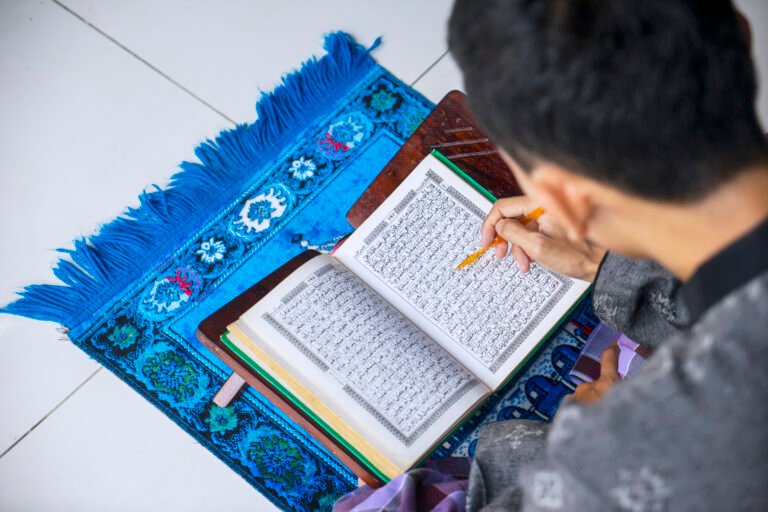Teaching Quran to Non-Arabic Kids
7 Powerful Ways to Teaching Quran to Non-Arabic Kids (2025 Complete Guide)
Every Muslim parent dreams of seeing their child connected deeply with the words of Allah — not just reciting them, but understanding and loving them. Yet, for many families living outside the Arab world, the question arises: How can we teaching Quran to non-Arabic kids in a way that’s easy, enjoyable, and lasting?
Teaching Quran to non-Arabic kids may seem challenging at first — especially when Arabic isn’t their native language — but the good news is that it’s absolutely possible. With the right methods, patience, and resources, any child can grow to read, memorize, and love the Quran.
This guide from Quran Window Academy will show you 7 powerful and practical ways For teaching Quran to non-Arabic kids in 2025 — using modern techniques, child-friendly tools, and faith-based motivation.
Al-Mushaf for Al-Sheikh Al-Minshawi
1. Start with the Arabic Alphabet and Pronunciation
Every great journey begins with the first step — and in learning the Quran, that step is the Arabic alphabet. Before teaching words or verses, help children recognize and pronounce each Arabic letter correctly.
At Quran Window Academy, teachers use visual charts, colorful flashcards, and fun repetition games to make pronunciation engaging. This foundation helps kids avoid confusion between similar sounds like س (Seen) and ص (Saad), which are critical for accurate recitation.
Tips For Teaching Quran to Non-Arabic Kids at This Stage
Use short daily lessons (10–15 minutes) instead of long sessions.
Focus on one new letter at a time.
Reinforce with writing practice and simple recitation.
The goal isn’t speed — it’s clarity and confidence.
2. Use Phonetics and Transliteration as Support Tools (Teaching Quran to non-Arabic Kids)
When kids can’t yet read Arabic fluently, transliteration (writing Arabic words using English letters) can help bridge the gap.
For example:
Bismillah ir-Rahman ir-Raheem (بِسْمِ اللَّهِ الرَّحْمَـٰنِ الرَّحِيمِ)
This helps non-Arabic kids start reciting early while slowly transitioning to reading Arabic script.
However, it’s important not to rely on transliteration for too long — it’s a temporary step toward Quranic reading, not a replacement.
3. Teaching Quran to non-Arabic Kids with Meaning: Connect Words to Understanding
One of the most powerful ways to teach Quran to non-Arabic kids is to help them understand what they recite.
Instead of memorizing blindly, explain the meaning of short surahs and common words. When a child understands that “Ar-Rahman” means The Most Merciful, they begin to build love and connection with Allah’s words.
At Quran Window Academy, teachers integrate English explanations during lessons, so children not only recite beautifully but also grasp the message behind each verse.
Why Meaning Matters
It develops spiritual connection, not just memorization.
It increases focus and motivation during lessons.
It builds early Quranic vocabulary.
4. Make Learning Interactive and Fun For teaching Quran to non-Arabic Kids
Children learn best when they’re engaged and enjoying themselves. Instead of traditional repetition, try interactive activities:
Quran quizzes and games
Reward charts for memorized surahs
Group recitation circles online
Short storytelling sessions that explain the surah’s message
Modern platforms like Quran Window Academy include interactive visuals, storytelling, and personalized encouragement — turning Quran time into a joyful experience, not a forced routine.
5. Focus on Short Surahs for Early Success For teaching Quran to non-Arabic Kids
Start small. Beginning with short surahs from Juz Amma helps kids gain confidence and a sense of achievement.
When children memorize Surah Al-Ikhlas, Surah Al-Falaq, or Surah An-Nas, they feel proud — and that motivation becomes fuel to continue.
Practical Tip
Combine recitation and meaning lessons. For example:
After memorizing Surah Al-Ikhlas, discuss how Allah is One, and what “As-Samad” means.
This approach transforms memorization into meaningful learning.
If you’re looking for a structured path, consider joining the Quran Recitation for Kids and Quran Memorization for Kids programs at Quran Window Academy — both designed specifically for non-Arabic speaking children.
6. Build Consistency and Patience in the Learning Routine
Consistency beats intensity.
Set a regular schedule — even 15 minutes daily — and stick to it. Kids learn better when they know what to expect.
Encourage, don’t pressure. Every child learns at their own pace. Some may master letters quickly; others take longer. What matters is progress, not perfection.
Tips to Stay Consistent
Choose a calm time of day (after school or before bedtime).
Keep lessons short but regular.
Celebrate small achievements — like finishing one surah.
At Quran Window Academy, teachers track each child’s progress individually and motivate them through gentle encouragement and positive feedback.
7. Choose the Right Online Quran Platform
In 2025, technology makes it easier than ever for teaching Quran to non-Arabic kids — but not every platform offers real learning quality.
When choosing an online academy, look for:
✅ Native Arabic teachers with experience teaching kids
✅ One-on-one personalized lessons
✅ Structured curriculum (recitation, tajweed, memorization)
✅ English-speaking support for parents
That’s where Quran Window Academy shines. The academy provides professional Egyptian teachers from Al-Azhar, trained to teach non-Arabic speaking children using gentle methods, interactive materials, and Quran-centered stories.
Courses You Can Enroll Your Child In
Quran Recitation for Kids: Helps children master Arabic letters, tajweed, and correct pronunciation.
Quran Memorization for Kids: Builds memory, focus, and understanding of Allah’s words step by step.
Both courses nurture not only the child’s recitation but also their love and respect for the Quran.
How Quran Window Academy Helps Non-Arabic Kids Learn Quran
At Quran Window Academy, the mission is simple:
To help every child — no matter their language — build a lifelong connection with the Quran.
Key Features:
Native Egyptian teachers from Al-Azhar University
Personalized one-on-one online sessions
Flexible scheduling for global time zones
Child-friendly materials and engaging visuals
Progress reports for parents
Parents often share that their children’s confidence grows rapidly — not only in reading but also in understanding the Quranic message.
Parent Tips for Supporting Quran Learning at Home
Your role as a parent is crucial. Even if you’re not fluent in Arabic, your encouragement makes all the difference.
Simple Tips:
Listen to Quran recitations together before bedtime.
Praise every effort your child makes — no matter how small.
Display their certificates or progress charts proudly.
Let them see you reading Quran — children imitate what they see.
A supportive home turns Quran learning into a family journey of faith.
Common Challenges When Teaching Quran to Non-Arabic Kids (and How to Overcome Them)
1. Lack of Arabic Understanding
Solution: Use bilingual explanations. Teach one Arabic word’s meaning each day.
2. Short Attention Spans
Solution: Keep lessons short (10–15 minutes) and full of variety — games, songs, repetition, and visuals.
3. Pronunciation Difficulties
Solution: Focus on tajweed basics with clear examples and repetition.
4. Irregular Schedules
Solution: Fix a routine and stick to it. Online academies like Quran Window can help create structure and accountability.
Motivating on Teaching Quran to non-Arabic kids to Love Quran
The key to long-term success isn’t just teaching — it’s inspiring.
Kids need to feel that learning the Quran is special, fun, and rewarding.
How?
Share stories of young companions who memorized the Quran.
Remind them that every letter brings reward from Allah.
Celebrate milestones — finishing a surah, reciting beautifully, or remembering meanings.
At Quran Window Academy, teachers use storytelling, compassion, and encouragement to make every child feel successful and connected to Allah’s words.
Conclusion: Turn Quran Learning into a Lifelong Gift
Teaching Quran to non-Arabic kids isn’t just about reading or memorizing — it’s about planting love, meaning, and faith in their hearts.
With the right approach, every child — regardless of language — can become a confident reciter and a lover of Allah’s Book.
If you want to start this journey with your child, explore:
Quran Memorization for Kids
at Quran Window Academy — where experienced Al-Azhar teachers guide non-Arabic kids step by step with care, patience, and faith.
🌿 Give your child the gift of the Quran — one verse at a time.








